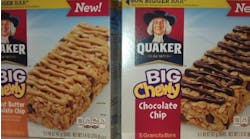Every August we publish our Top 100© report, the list of the 100 largest food and beverage companies in the U.S. and Canada. And every August we search for a common thread, a theme that seems to capture the current state of the business side of this industry. This year, finding a theme wasn’t difficult.
There’s been so much talk about looking overseas for growth – of exporting your products to far-off lands, establishing an office there or buying a foreign company. And there has been plenty of that the past couple of years in the food and beverage industry. It’s been a theme of past Top 100© reports.
But when we looked at the numbers and the news headlines of the past few months, it became apparent there’s a “buy American” campaign going on.
We’ve chronicled many examples of American food and beverage processors buying other American food companies. And a few instances where Canadian and Latin American firms reached across their borders. (Interestingly, foreign-based firms JBS, Grupo Bimbo and Saputo Group now have more sales in the U.S. than in their homelands.) And a blockbuster deal of last year, in which Chinese meat company Shuanghui Holdings (now called WH Group Ltd.) bought Smithfield Foods.
With the help of the Food Institute, we even came across Vietnam Dairy Products JSC buying a 70 percent stake in California-based Driftwood Dairy Holding Corp.
As we say in the introduction to this year’s Top 100© report, the world suddenly has become an unstable place to do business. America seems like the safest place to put your money. And American food & beverage processors appear to be awash in greenbacks. 65 of these 100 companies enjoyed sales increases last year, and 61 (out of a smaller base) also bettered their profits. The economy seems solid, these firms are sitting on hoards of cash and loans can still be gotten on the cheap – although maybe not for too much longer. So buy while the buying is good.
A glance at the current merger & acquisition activity confirms all this, and reveals the strategic underpinnings. It’s time to get more horizontal. Campbell Soup appears to have maxed out as a soup company. Ergo, Plum Organics takes it into premium baby food and Bolthouse Farms into high-end juices and vegetables. Post is no longer a cereal company thanks to the five divergent acquisitions in 2013 and two more this year. Dean Foods spinoff WhiteWave buys an organic produce company. Canned fruits & vegetables – boring! Premium pet food is where people are spending their money. Just ask Del Monte (now known as Big Heart Pet Brands).
Even the current big play – Tyson Foods buying Hillshire Brands – is more about branching out than about commonalities (although there’s quite a bit of synergy in the two companies as well).
But, as happens every year, we also kind of miss names like Ralcorp, Sara Lee, Swift, Birds Eye, Michael Foods. Fortunately, there always are up-and-comers waiting to take their places.

